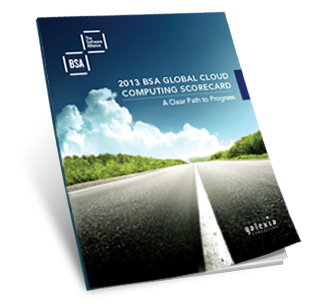Robert Holleyman| Huffingtonpost
It’s no secret that enterprises of all types and sizes are embracing cloud computing. Worldwide, that migration will add more than $1 trillion a year in new business revenues, according to research firm IDC. Less understood, however, is the fact that governments are promulgating a mismatched patchwork of laws and regulations that effectively chop the global cloud market into country-sized pieces.
BSA’s newly released 2013 Global Cloud Computing Scorecard illustrates this worrisome trend. Building on baseline measurements we established last year in the inaugural edition of the Scorecard, this new report is the first study ever to track year-over-year changes in the global policy landscape for the burgeoning cloud. It finds that legal frameworks for cloud computing are improving, but unevenly. This patchiness threatens to undermine the economies of scale and efficiency that are at the heart of the cloud’s value proposition.
This year’s study finds noteworthy progress among a small number of countries that have quickly advanced in the Scorecard rankings by embracing key international norms and adopting policies to build user trust while enabling innovation. Singapore, for example, has jumped from 10th to fifth in this year’s rankings by enacting a new privacy law that recognizes people’s right to protect their personal information and companies’ need to use data for reasonable purposes.
But the study also finds that many of the world’s biggest IT markets, while starting from a strong position, appear to be losing momentum. All six EU countries covered in the study have slid in the 2013 rankings. Even more troubling is the fact that countries such as Korea, Indonesia, and Vietnam are taking steps to effectively unplug themselves from the global cloud — by tying up cloud providers in administrative red tape, for example, or preventing international players from entering local markets.
This back-tracking is significant, not only because it impacts individual economies and consumers, but because the patchwork-policy effect limits the horizons of the entire global market for cloud computing services. Mismatched laws and regulations can act like virtual walls and fences, making it hard for data to flow across borders. In some cases, the motivation for these policies is to foster local cloud services. But the irony is protectionism doesn’t really protect anyone. It only inhibits business growth and reduces consumer choice in the inherently global digital economy.
The Cloud Scorecard underscores that no country is an island in the cloud era; everyone benefits from a cohesive approach. We don’t need rigidly uniform cloud laws from one country to the next. But policymakers around the world must provide legal and regulatory frameworks that foster innovation, provide incentives to build the infrastructure to support it, and promote confidence that using the cloud will bring the anticipated benefits without sacrificing expectations of privacy, security, and safety. The Scorecard provides a policy blueprint for making that happen. If countries around the world follow it, we will be on a clear path to progress.













